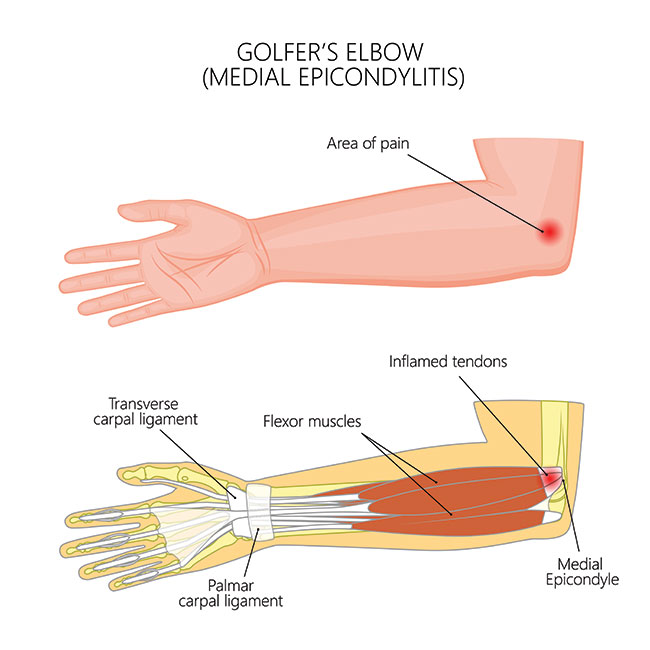If you think you have to play golf to experience the pain and tenderness of the golfer’s elbow, then you are wrong! Several muscles connect and come together in your elbow to perform everyday functions. You can flex your arms and wrist with the help of these muscles. Golfer’s elbow is also called medial epicondylitis, which occurs inside the elbow where tendons in the forearm muscle connect to the bony part. Tendons attach muscles to bones; an injury or irritation can cause them to swell and become painful. It can happen suddenly or may take time to develop and can have mild to severe symptoms. If you experience a golfer’s elbow, you may have:
- Pain on the inside of your elbow
- Stiffness in your elbow
- Hand and wrist weakness
- Tingling sensation or numbness in the fingers may radiate into other fingers, especially the ring and little fingers.
The pain can affect your everyday activities, such as opening doors, picking up things, a handshake, etc. The condition usually affects your dominant arm and should not be ignored.
Causes of Golfer’s Elbow
The condition is caused by repetitive motions, which makes it common among athletes. People who play tennis use their arms to swing their rackets, while golfers repeatedly swing their golf clubs. Playing baseball, rowing, weightlifting, and typing on the computer can also lead to the condition. This overuse of arms and wrists damages tendons and triggers pain, stiffness, and weakness.
How to Prevent Golfer’s Elbow?
- Build your arm strength – Try lifting light weights or squeezing rubber balls
- Stretch before any physical activity – Be it any sports, it is good to do a light warm-up or stretches, such as walking or jogging.
- Practice correct form – Incorrect techniques can do more damage than any good. It increases your stress on the elbows and wrists. Playing any sport or working out with a proper technique is the only way to do it.
- Take rest – Stop any activity that causes pain.
Treatment
If you think your pain isn’t improving, then it is time you reach out to FORM Hand Therapy. We will thoroughly assess your medical history, condition, pain level, symptoms, and recent injuries. Also, associated risks at your workplace or if you have participated in activities that led to your pain. We thoroughly examine your fingers, hand, and wrist to determine the source of your pain. Before coming to any diagnosis, we will conduct x-rays and an MRI to rule out other possible causes, such as any fracture or arthritis. Anti-inflammatory, physical therapies, stretching, and splinting can help the condition. Remember, if you do not get proper treatment for your situation, it can worsen over time, leading to chronic pain and permanent weakness. To learn how we can help your case, schedule an appointment with FORM Hand Therapy at (510) 350-3030 today.

